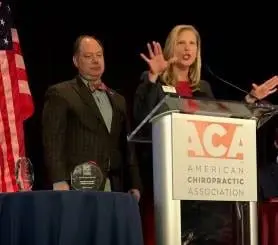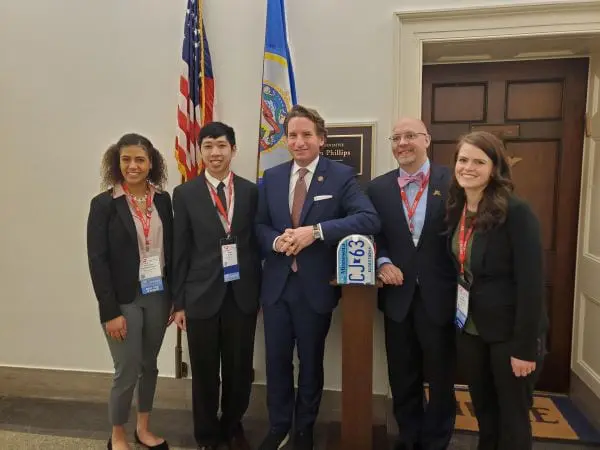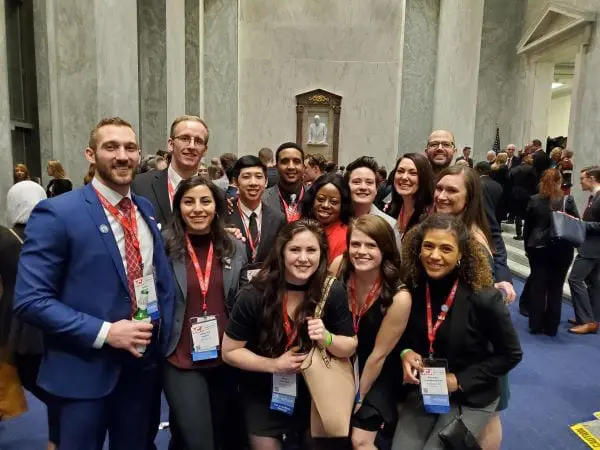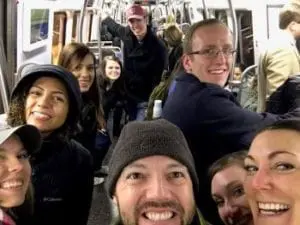NWHSU Leaders and Students Lobby for the Chiropractic Profession in Washington, D.C.
Last week, Michele Maiers, D.C., MPH, Ph.D., the Executive Director of Research and Innovation at Northwestern Health Sciences University, traveled with a group of chiropractic students and senior leaders from NWHSU to Washington, D.C. to attend the American Chiropractic Association (ACA) Engage 2020 conference.
For more than 30 years, Northwestern Health Sciences University has sent students, faculty, and administrators to learn, network, and advocate for the chiropractic profession with lawmakers on Capitol Hill.

Dr. Michele Maiers speaks to attendees at the ACA Engage 2020 event in Washington, D.C.
Dr. Maiers has attended for the last 23 years.
“I first went during my second trimester as a chiropractic student,” Dr. Maiers says. “The experience completely changes your perspective about the profession and your role in it. When you’re a student it’s easy to feel consumed by the next test and the next lab class and the next board exam. But when you go to an event like this, it really puts into focus what’s happening with the profession, what your responsibilities are as a member of the profession, and what opportunities exist to help shape where it’s headed.”
Chiropractors Committed to Advancing the Profession
Formerly known as the National Chiropractic Leadership Conference (NCLC), ACA Engage brings together industry leaders from all over the U.S. to meet with members of Congress on Capitol Hill, and also offers a rich program of education offerings, presentations from respected thought leaders, and panel discussions on important topics. This year, more than 700 attended the event.
When Dr. Maiers started attending ACA Engage, the reception toward chiropractic advocacy on Capitol Hill was very different than it is today.
“When I first started going, we did a lot of explaining of what chiropractic was, why people go to chiropractors, what the evidence was supporting chiropractic,” Dr. Maiers says. “Today, it’s accepted. People know what chiropractic is. Staffers often volunteer, ‘Oh, I love my chiropractor.’”

NWHSU students meet with Minnesota Representative Dean Phillips on Capitol Hill in Washington, D.C.
Not only are more lawmakers and support staff familiar with the chiropractic profession, but also they’re much more open to hearing about alternative treatments for pain in the wake of the opioid epidemic.
“The last few years, policymakers are focused on creating access to safer ways to treat pain,” Dr. Maiers says. “There is a much greater receptiveness, and an attitude of ‘Okay, we have an evidence-based discipline here, how do we break down barriers to make sure people have access?’ It’s been a completely different conversation.”
Students Travel to Capitol Hill to Learn, Grow as Professionals
That’s good news for students like Benjamin Degenhardt, who’s enrolled in the NWHSU chiropractic program and traveling to ACA Engage for the second year in a row.
A Midwest native who chose NWHSU because he wanted to understand the science behind his practice, Degenhardt considers the 2019 ACA conference, the first ACA conference he attended, a personal and professional highlight of his academic career.
“It was a life-changing few days,” Degenhardt says. “The excitement and passionate determination we all shared as we advocated at the Capitol, and the breadth of subjects presented on over the following days got me absolutely fired up about what we were doing, and who we as students were becoming.”
Kathleen Williams, NWHSU chiropractic student and president of the university’s chapter of the Student American Chiropractic Association (SACA), considered the event an incredible opportunity to advocate for the chiropractic profession.
“Students have powerful and unique voices and our representatives are listening,” Williams says. “We are the future of the chiropractic profession, and it is up to us to create the support we need in order to get our patients access to the care they deserve.”

Members of NWHSU’s Student American Chiropractic Association (SACA) chapter represent the school on Capitol Hill.
Advocating for Access to Chiropractic Care
On Thursday, January 30, students, chiropractors, and school administrators focused their lobbying efforts on one bill, H.R. 3654, that would expand Medicare reimbursement to include all covered benefits that are within the chiropractic scope of practice—physical examinations, x-rays, and more—as well as adjustments, which are currently a covered benefit.
“We typically lobby to give greater access to specific populations,” Maiers says. “This year, our main focus is Medicare. We’ve got an aging adult population for whom back problems are leading cause of disability. We need to help older adults age in place. If they’re not functionally able to stay in their homes and continue to work or actively participate in society, we have a huge problem on our hands.”
The ACA’s past lobbying efforts have been successful, according to Maiers. The group has helped improve access to chiropractic services for both veterans and active military members.
“It’s been so rewarding to see over the years our lobbying efforts have increased the access for those populations to chiropractic care,” Maiers says. “Combat readiness is an issue that is getting increasing attention from legislators. Chiropractic can be an important part of the solution.”
NWHSU students will be part of the Minnesota delegation, but often visit lawmakers from neighboring states, including Iowa, Wisconsin, North Dakota, and South Dakota, according to Dr. Maiers. This allows students to not only get exposure to lawmakers, but also build professional connections with practicing chiropractic doctors in the region.
“About half of our Minnesota representatives are new, just elected this last term,” says Dr. Maiers. “This is another opportunity for the university to deepen a relationship with these folks and make sure that they know NWHSU can be an ongoing resource for their offices.”
Influencing Public Policy Year-Round
After the ACA Engage conference is over, the Healthcare Innovation and Policy team at NWHSU will continue working to support and advocate for public policies that include all of its health professions—especially the disciplines not fully covered by insurance payers, including chiropractic care, acupuncture and Chinese medicine, and massage therapy.
Maiers and her team at NWHSU’s Center for Healthcare Innovation and Policy regularly publish policy statements that compile the latest research for lawmakers to aid their efforts in creating forward-thinking, evidence-informed policy. The most recent policy statement, Looking Beyond the Opioid Misuse Epidemic: The Role for Non-Pharmacologic Treatment of Musculoskeletal Pain, outlines critical research supporting conservative, non-opioid treatments for pain management.
“This institution is all about finding innovative solutions to hard healthcare problems, and integrating them,” said Deborah Bushway, Ph.D., President and CEO of NWHSU. “And we have members of our community with the expertise and desire to contribute to policy conversations involving the safe and effective management of pain.”
From Washington D.C. to Saint Paul
Soon after they return from ACA Engage 2020, NWHSU senior leaders, faculty, and students will mobilize again to influence public policy—this time on the state level. On February 27, 2020, the Minnesota Chiropractic Association is hosting its annual Day at the Capitol, which pairs professional advocacy with Minnesota representatives with continuing education for chiropractors.
“There’s a larger group of senior leaders and faculty from the school who will be meeting with a larger number of lawmakers in both the Minnesota state senate and house,” Dr. Maiers says.
It’s not just the university leaders who will be attending this event: NWHSU chiropractic students are motivated to attend as well. Degenhardt, who was paired with the Wisconsin coalition, saw first-hand the value of aligning state and national association lobbying efforts.

NWHSU students ride the Washington D.C. metro during their life-changing visit to our nation’s capitol.
“The advocates for Wisconsin had great success on Capitol Hill, because doctors from the Wisconsin Chiropractic Association presented the Medicare bill to Wisconsin representatives in their home districts,” Degenhardt says.
“We had several representatives tell us, ‘Oh yes, I remember this bill, we’ve talked about this before.’ We didn’t have to present it as an entirely new issue. Instead, it was a more detailed discussion. I’m very much looking forward to the MCA Day at the Capitol, to maintain that discourse and cooperation between the state to national associations.”
After an inspiring first visit to Washington D.C. for the ACA event, Williams made a personal commitment to continue her involvement with ACA, and her advocacy for her profession, into her career as a chiropractic doctor.
“There are big changes happening in medicine and conservative care is at the very forefront of these changes,” Williams says. “We need to speak up, we need to lobby, and we absolutely must do so with the passion and integrity. I am committed to continuing to advocate and lobby for our patients and their best health outcomes. I will be attending the MCA Day on the Capitol, and the goal is to continue the work that we did in Washington, back at a local level!”